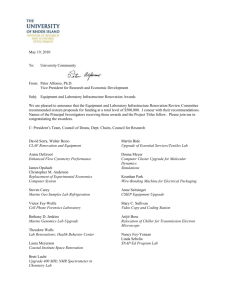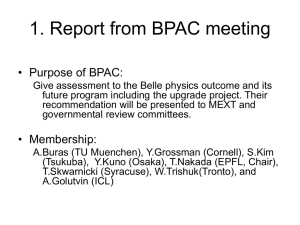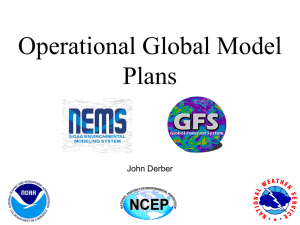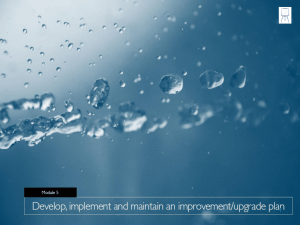Mandatory Upgrade Training Requirements for all
advertisement
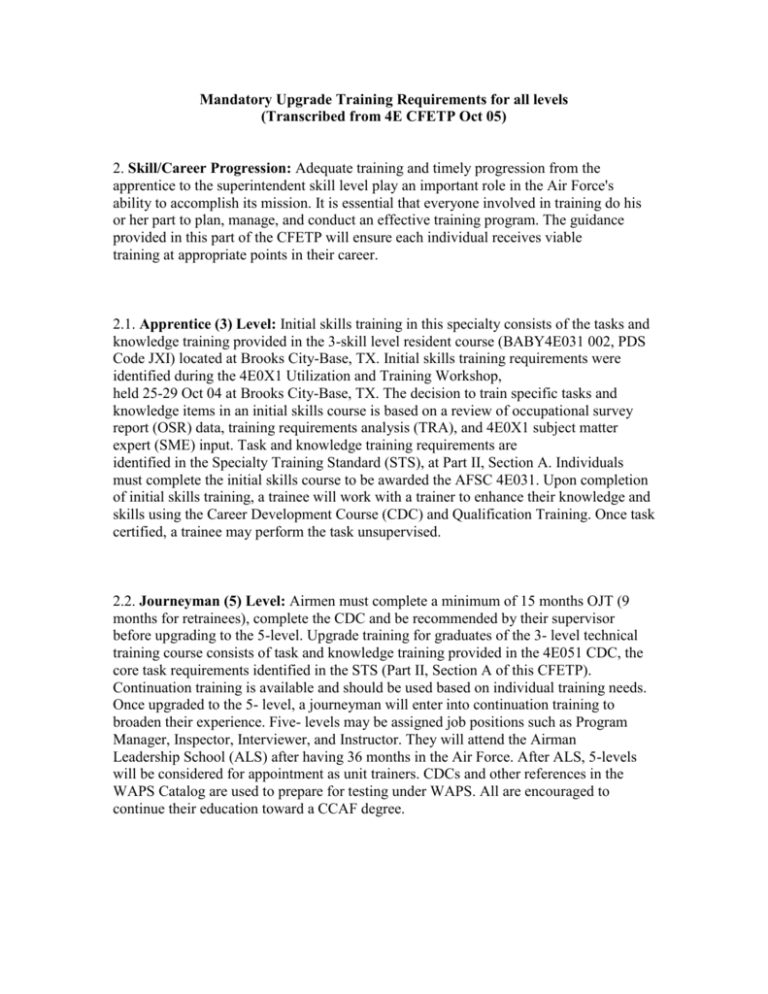
Mandatory Upgrade Training Requirements for all levels (Transcribed from 4E CFETP Oct 05) 2. Skill/Career Progression: Adequate training and timely progression from the apprentice to the superintendent skill level play an important role in the Air Force's ability to accomplish its mission. It is essential that everyone involved in training do his or her part to plan, manage, and conduct an effective training program. The guidance provided in this part of the CFETP will ensure each individual receives viable training at appropriate points in their career. 2.1. Apprentice (3) Level: Initial skills training in this specialty consists of the tasks and knowledge training provided in the 3-skill level resident course (BABY4E031 002, PDS Code JXI) located at Brooks City-Base, TX. Initial skills training requirements were identified during the 4E0X1 Utilization and Training Workshop, held 25-29 Oct 04 at Brooks City-Base, TX. The decision to train specific tasks and knowledge items in an initial skills course is based on a review of occupational survey report (OSR) data, training requirements analysis (TRA), and 4E0X1 subject matter expert (SME) input. Task and knowledge training requirements are identified in the Specialty Training Standard (STS), at Part II, Section A. Individuals must complete the initial skills course to be awarded the AFSC 4E031. Upon completion of initial skills training, a trainee will work with a trainer to enhance their knowledge and skills using the Career Development Course (CDC) and Qualification Training. Once task certified, a trainee may perform the task unsupervised. 2.2. Journeyman (5) Level: Airmen must complete a minimum of 15 months OJT (9 months for retrainees), complete the CDC and be recommended by their supervisor before upgrading to the 5-level. Upgrade training for graduates of the 3- level technical training course consists of task and knowledge training provided in the 4E051 CDC, the core task requirements identified in the STS (Part II, Section A of this CFETP). Continuation training is available and should be used based on individual training needs. Once upgraded to the 5- level, a journeyman will enter into continuation training to broaden their experience. Five- levels may be assigned job positions such as Program Manager, Inspector, Interviewer, and Instructor. They will attend the Airman Leadership School (ALS) after having 36 months in the Air Force. After ALS, 5-levels will be considered for appointment as unit trainers. CDCs and other references in the WAPS Catalog are used to prepare for testing under WAPS. All are encouraged to continue their education toward a CCAF degree. 2.3. Craftsman (7) Level: Individuals must be SSgt selectees or above to enter 7-level upgrade training. They must complete 12 months (6 months for retrainees) OJT for award of the 7-skill level. Upgrade training to the 7- level in this specialty consists of task and knowledge training provided by completion of the following pre-requisite and OJT in the core task requirements identified in the STS (Part II, Section A of this CFETP): 2.3.1. Operational Entomology Course (B3OZY43M3-000): held at USAFSAM Brooks City-Base, TX, ~or~ Vector-Borne Disease Control Course from the Centers for Disease Control and Prevention (available as a distance-learning tool managed by USAFSAM) 2.3.2. Applied Epidemiology Course (B3OZYAPEPI-001): conducted at USAFSAM Brooks City-Base, TX ~or~ Epidemiology Distance Learning Course (Available as a distance learning tool managed by USAFSAM) 2.3.3. Food Safety Training: web-based via EduNeering training platform. 2.3.4. Office Management Distance Learning Tool: web-based and provided by USAFSAM. Table 2.3.5. Shows the phase-in period for newly established 7- level training requirements. Please see Education and Training Course Announcements (ETCA), https://etca.randolph.af.mil, for attendance requirements for formal courses conducted at Brooks City-Base. Distance Learning Tools listed above are provided by USAFSAM to trainers and supervisors to assist with training. It is the supervisors responsibility to ensure effective training and that the trainee can successfully perform required tasks. The distance learning tools or Centers for Disease Control and Prevention courses can be completed any time after award of the 5-skill level. Continuation training is available and should be used based on the individual’s training needs. A craftsman can expect to fill various supervisory and management positions such as Noncommissioned OfficerinCharge (NCOIC) of a flight or element, and task certifier. They may also be assigned to work in staff positions and as technical school instructors. Craftsmen should pursue education and training to advance their knowledge of the management of resources and personnel. Prior to promotion to MSgt, craftsmen will be selected to attend a Command NCO Academy. Continued academic education through CCAF and higher degree programs is encouraged. Increasing experience in public health management and broadening responsibilities in the medical treatment facility are recommended for senior NCO promotion. Table 2.3.5. Mandatory Seven-Level Training Requirements: Criteria for 7-level upgrade (for those promoted to SSgt after 1 August 2005): REQUIRED DATE COMPLETED TASK / COURSE X Supervisor/Training Manager Endorsement CDC Vectorborne Disease Control Course or USAFSAM Distance Learning Tool or Operational Entomology Course X USAFSAM Epidemiology Distance Learning Tool X Food Safety Training (EduNeering Distance Learning Tool) X USAFSAM Office Management (Distance Learning Tool) X Advanced Standards (In-residence or Distance Learning) X Complete training in Core Tasks identified in STS X Complete 12 months upgrade Training X 2.4. Superintendent (9) Level: AFSC 4E091 will be awarded upon promotion to SMSgt, and after satisfying the requirements of AFMAN 36-2108. A 9-level can be expected to fill positions such as MAJCOM Public Health Functional Manager, Superintendent, Public Health Flight and may include additional duty as Superintendent, Aerospace Medicine Squadron. Additional training in the areas of budget, manpower, resources and personnel management should be pursued through continuing education. Higher education and greater responsibilities within the medical treatment facility and in the host unit, base, or community are highly recommended for senior NCOs. 3. Training Decisions: During the Oct 2004 U&TW, we adjusted 3-, 5-, and 7-level upgrade training requirements as follows: 3.1. Three (3) Skill Level Upgrade Requirements: No significant changes were made. Initial skills are provided to all entry- level personnel by graduating the Public Health Apprentice Course. 3.2. Five (5) Skill Level Upgrade Requirements: MAJCOM functional managers/subject matter experts designated sixty-three (63) tasks as “core” requirements. In addition to other mandatory requirements, training on these specific tasks must be completed (with trainee and trainer initials) prior to upgrade to the 5-skill level. 3.3. Seven (7) Skill Level Upgrade Requirements: Adjustments to mandatory training requirements included food safety training transitioning to internet-based training through EduNeering (32 training modules); these modules will be available 24 hours/day, 7 days/week to all registered users. Additionally, the Public Health Contingency Operations Course is no longer a mandatory training requirement. Public Health Airmen assigned to mobility duties should complete this course prior to deployment. Disconnecting this course from the mandatory list of 7-skill level upgrade requirements allows this course to be completely overhauled to meet the needs of the entire Team Aerospace contingent. 3.4. Proficiency Training: Any additional knowledge and skill requirements, which were not taught through initial skills or upgrade training, were assigned to continuation training. The purpose of the continuation training program is to provide additional training exceeding minimum upgrade training requirements with emphasis on present and future duty positions.
